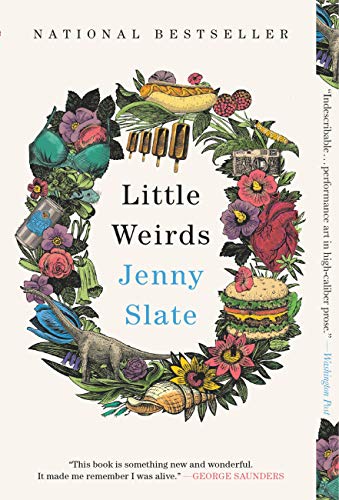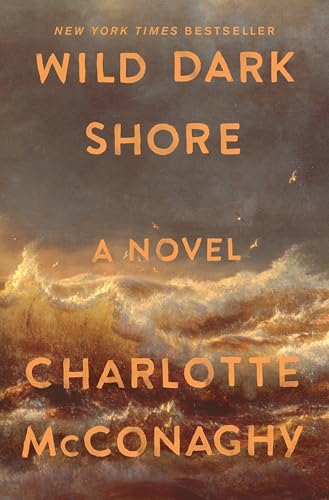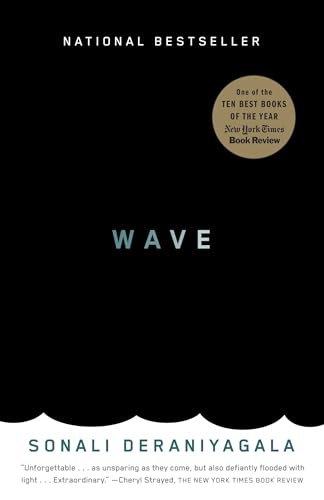This collection of (semi?) autobiographical essays and strange imagined short fictions are often written in stream of consciousness or in choppy prose poem form. It was honestly exhausting to try and follow Slate's random trains of thought within each piece, never mind reading multiple pieces back to back. The pieces themselves feel as if they are trying too hard to be as quirky as possible, forcing the weird of the title, overwhelming the organic flow of the stories she's ostensibly trying to tell. This is billed as feminist and funny and universal and I have to wonder about the critics and readers claiming this. I missed the humor entirely (admittedly this could be a me thing rather than a her thing). I found some of her rage at the patriarchy manufactured simply for the sake of rage (and I say this as a woman who is not blind to the many faults of the patriarchy). And there was not one universal thing here as compared to my life (could I be too old to relate?). I am trying to give this book the benefit of the doubt with my parenthetical comments but to be completely honest, the reading experience was tedious and I was bored throughout.
Monday, August 25, 2025
Review: Little Weirds by Jenny Slate
This collection of (semi?) autobiographical essays and strange imagined short fictions are often written in stream of consciousness or in choppy prose poem form. It was honestly exhausting to try and follow Slate's random trains of thought within each piece, never mind reading multiple pieces back to back. The pieces themselves feel as if they are trying too hard to be as quirky as possible, forcing the weird of the title, overwhelming the organic flow of the stories she's ostensibly trying to tell. This is billed as feminist and funny and universal and I have to wonder about the critics and readers claiming this. I missed the humor entirely (admittedly this could be a me thing rather than a her thing). I found some of her rage at the patriarchy manufactured simply for the sake of rage (and I say this as a woman who is not blind to the many faults of the patriarchy). And there was not one universal thing here as compared to my life (could I be too old to relate?). I am trying to give this book the benefit of the doubt with my parenthetical comments but to be completely honest, the reading experience was tedious and I was bored throughout.
Sunday, August 24, 2025
Review: Wild Dark Shore by Charlotte McConaghy
Opening with an injured woman rescued from the freezing water around Shearwater Island, this is cli-fi, a thriller, a warning, and a beautifully written literary novel all wrapped in one. Rowan is badly injured and nursed back to health by Dominic Salt, the island and former research base's caretaker, and his three children, Raff, Fen, and Orly. Dominic doesn't trust Rowan. Why would she be coming to Shearwater, this remote island near Antarctica? Rowan doesn't trust Dominic either. She's asking questions about the now abandoned research base and is skeptical about his assertion that all their communications equipment has been destroyed, severing their connection to mainland Australia. While Rowan and Dominic might be wary of each other and the secrets each senses the other is keeping, the Salt children are much more open to this enigmatic woman who has arrived on their shores, especially the youngest child, nine-year-old Orly who has a keen interest in the seeds kept in the seed vault on the island, a vault which is now in danger of imminent collapse due to encroaching sea water. As the sea water continues to rise and the characters have no choice but to wait six weeks for the scheduled arrival of the ship coming to evacuate them and the most vital of the banked seeds, so does the tension in the novel. All five of the characters narrate their own stories, giving glimpses of their pasts, fleshing out their characters, and sharing their tragic losses with the reader.
McConaghy's evocation of a windswept island being inexorably consumed by the sea, the wild life that makes their home on its shores, and the plants that survive in such an inhospitable environment made even more inhospitable by climate change is beautiful. Her slow reveals of each character's secrets, even as they forge deeper relationships to each other keep the reader turning the pages. There is an otherworldly feel to the novel but also a sense of reckoning, both for the characters and for the reader who must acknowledge that this apocalyptic version of the world could be scarily prescient. And although this is a novel grappling with the damage that human beings do to the earth, to the animals and plants around us, to each other, it is also a novel about love and hope and perseverence. Grief winds its way throughout the narrative but so does deep love. This is a stunning read.
Friday, August 22, 2025
Wave by Sonali Deraniyagala
In 2004, economist Sonali Deraniyagala was on holiday in Sri Lanka with her husband and their two school aged sons, spending Christmas with her parents at a seaside resort she'd been visiting since she was a child growing up in the country, when in an instant everything changed. As Deraniyagala stood and watched, a tumbling white wave came rushing toward their room. She and her husband grabbed both of their boys and ran, finding a Jeep to climb into to try and escape the onslaught of the ocean. But the Jeep couldn't outrun the wave and it was upended, with Deraniyagala losing sight of her family while fighting for her own life. Miraculously surviving the tsunami and in shock, she then faced the darkest time of her entire life, fearing and then knowing for sure that Steve, their boys Vik and Malli, and both of her parents were missing and had lost their lives while she had not.
This memoir is not just the account of the terrible wave that swept into her life and devastated it, but also of the aftermath, of her desperate madness, the overwhelming desire for her own death, the stark grief she suffered, and her own soul stripped bare. She shied away from looking too closely at such an all-encompassing loss until she could no longer avoid it, protecting her mind from the personal remembrances that could derail her, and yet she had to go on living, go on in a world without her most beloved people in it. She writes beautifully and movingly of the natural world, shares the intense and harrowing feelings that grief engendered in her, and gives glimpses of who her husband, her sons, and her parents were and how she continues to navigate a world without them so many years on from her loss. The book is raw and unfiltered, emotional and crushing. It is also a powerful testament to love.
Monday, August 11, 2025
Review: Train Go Sorry by Leah Hager Cohen
At the time of her writing of the book, Cohen's father Oscar was the superintendent of the Lexington School for the Deaf in New York so Cohen herself spent quite a lot of time in or adjacent to the deaf community, although as a hearing child she didn't attend the school or learn ASL herself until adulthood. She had a unique entre into the deaf community via her father and via her paternal grandparents, both of whom were deaf. The book jumps around touching on a variety of topics, from the politics, debates, and discussions within the deaf community (students and staff at Gallaudet University had just successfully protested against a hearing president) to the fears that things like the pressure to mainstream deaf children instead of maintaining dedicated schools and the push towards cochlear implants would lead to an erasure of deaf culture. She presents the arguments for and against ASL, signed exact English, and vocalization without offering a value judgment on any of them as options in the world. She discusses sign language interpreting, including her own experience learning to interpret, and considers how interpreters are not native speakers of sign language, presenting challenges that most hearing people wouldn't ever have thought about (I sure hadn't!). She shares tales of her own deaf grandparents, telling of both the difficulties (and tragedies) and the joys in their lives in a hearing world. And finally, she weaves stories of two students at the school throughout the rest of her narrative, sharing the extra challenges that James, whose family is economically disadvantaged, and Sophia, whose family is non-native English speaking, face as they work toward their high school degrees and toward a future that they are just starting to envision.
The book hops back and forth between all of Cohen's focuses, which can be a bit choppy but the information she presents is consistently interesting. She draws the attention of hearing readers to issues and concerns that they've probably never spared even one second of time thinking about, and has presented the needs and wants of the deaf community, which is not a monolith, in a balanced and thoughtful manner. There's history and personal stories both in this detailed and engaging non-fiction book. People who want insight into a people and community they probably don't have much knowledge about will learn a lot from this book, and yet leave it with a lot to think about.
Subscribe to:
Comments (Atom)
Popular Posts
-
When I saw the gorgeous boat on the cover of this book and found out that it was mostly set amongst summer cottages on a lake, I knew that ...
-
Cinco de Mayo is not the celebration of Mexican Independence. It's actually a regional celebration celebrating the victory of Mexican f...
-
Ever since the runaway success of 50 Shades of Grey, the (re)discovery of erotica has been foremost in the book world. People ask me all t...
-
This title makes me want to mimic monster truck commercials. MASSIVE, Massive, massive. BOOK, Book, book. GIVEAWAY, Giveaway, giveaway. ...
-
Authors, Publishers and Publicists… Thank you for considering me for the privilege of reviewing your books. I am a very eclectic reader and ...
-
Thanks to the lovely folks at Hachette Books I am giving away three copies of The Little Giant of Aberdeen County by Tiffany Baker. This ...
-
It was another slowish week in my mailbox but I'm not complaining. I am still up to my eyeballs in books I need to read for one thing o...
-
Thrillers are not my usual reading choice. In fact, I don't think I've ever read one that I haven't been pushed to in one way...
-
Today being Black Friday and all, some of you are probably out scouring the stores for the best possible deals for the special people on you...
-
I first read Kate Atkinson's Behind the Scenes at the Museum more than 20 years ago and was impressed by the creativity and writing ta...







